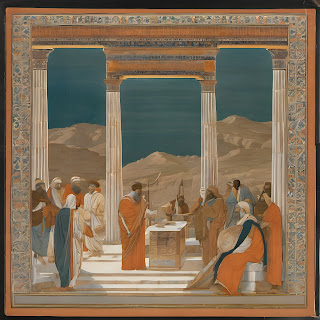Aeschylus' Oresteia is a monumental trilogy of ancient Greek tragedy that has captivated audiences for centuries. Composed by one of the greatest playwrights of the ancient worlds, Aeschylus, this trilogy explores the complex themes of justice, revenge, and the cyclical nature of violence. As the only surviving trilogy from ancient Greek theatre, Oresteia offers a unique glimpse into the rich and sophisticated dramatic tradition of the time.
Understanding the Structure of the Oresteia
The Oresteia is composed of three individual plays: Agamemnon, The Libation Bearers, and The Eumenides. Each play tells a distinct part of the tragic story of the House of Atreus. In Agamemnon, we witness the return of king Agamemnon from the Trojan war and the subsequent murder of him and his concubine by his wife, Clytemnestra. The Libation Bearers focuses on the vengeance of Agamemnon's children, Orestes and Electra, as they plot to kill their mother. Finally, in the Eumenides, we witness the trial of Orestes for matricide and the establishment of the first court of law in Athens.
The structure of the Oresteia is carefully crafted to create a sense of unity and progression. The three plays are interconnected through shared characters and themes, and they build upon each other to create a cohesive narrative. This structure allows Aeschylus to explore the consequences of violence and the complexities of justice in a profound and thought-provoking manner.
Themes and Motifs in Oresteia
The Oresteia is rich with themes and motifs that delve into the depths of the human condition. One of the central themes is the cycle of violence and revenge. The characters in the trilogy are trapped in a never-ending cycle of bloodshed, as each act of violence begets another. Aeschylus forces us to confront the destructive nature of revenge and question whether it can ever truly bring justice.
Another prominent theme in Oresteia is the struggle between personal justice and divine law. Orestes is torn between his father's murder and the moral dilemma of killing his own mother. This conflict raises profound questions about the nature of justice and the role of divine intervention in human affairs.
Additionally, Oresteia explores the concept of fate and the idea that individuals are bound by destiny. Aeschylus created a world in which characters follow predetermined paths and are subject to forces beyond their control. This fantastic worldview adds another layer of complexity to the tragedy and invites us to contemplate the limits of human agency.
Analysis of the Characters in the Oresteia
The Oresteia features a cast of compelling and complex characters who embody the struggles and conflicts of the human condition. Agamemnon, the doomed king, is a character torn between his duty as a leader and the consequences of his actions. Clytemnestra, his vengeful wife, is a powerful and enigmatic figure who seeks justice for her daughter's sacrifice. Orestes, their tormented son, grapples with the weight of filial duty and the burden of his own actions.
The trilogy also introduces us to a range of supporting characters, each with their own motivations and desires. Electra, Orestes' sister, serves as a symbol of resistance and a catalyst for change. The furies, ancient goddesses of vengeance, represent the primal forces of justice and retribution. Though the intricacies of these characters, Aeschylus explores the complexities of human nature and the moral ambiguities that define us.
The Role of Fate and Justice in the Oresteia
Fate and justice are central themes in Oresteia, intertwining to create a complex web of moral and philosophical questions. Aeschylus challenges our notions of justice by presenting a world in which divine law and human law are in conflict. The trial of Orestes, conducted in the third play, becomes a battleground for these opposing forces.
The furies, who represent the ancient concept of blood feuds and personal vengeance, clash with the newly established court of law in Athens, where human judgement and reason prevail. Aeschylus poses important questions about the nature of justice and whether it is ever possible to achieve it in a world where there are personal grudges and divine intervention.
Famous Quotes from the Oresteia
- ''He who learns must suffer. And even in our sleep pain that we cannot forget falls drop by drop upon the heart, and in our own despair, against our will, comes wisdom to us by the awful grace of God.'' - Agamemnon.
- ''For the nature of mortals is to overlook the present in their longing for the future and to value things that are absent as though they would always be theirs.'' - The Libation Bearers.
- ''Justice is like the kingdom of God; it is not without us as a fact; it is within us as a great yearning.'' - The Eumenides.








